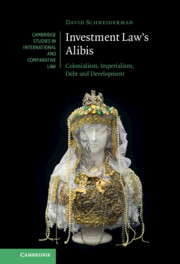Book contents
- Investment Law’s Alibis
- Cambridge Studies in International and Comparative Law: 168
- Investment Law’s Alibis
- Copyright page
- Dedication
- Epigraph
- Contents
- Acknowledgements
- Introduction
- 1 Colonialism of Investment Law
- 2 Imperialism of Investment Law
- 3 The Decline and Rise of Standards of Civilized Justice
- 4 The Stifling Threat of Debt
- 5 The Difficulty of Decolonizing Investment Law
- 6 Divesting for Development
- Conclusion
- Bibliography
- Index
- Cambridge Studies in International and Comparative Law: 168
4 - The Stifling Threat of Debt
Published online by Cambridge University Press: 21 July 2022
- Investment Law’s Alibis
- Cambridge Studies in International and Comparative Law: 168
- Investment Law’s Alibis
- Copyright page
- Dedication
- Epigraph
- Contents
- Acknowledgements
- Introduction
- 1 Colonialism of Investment Law
- 2 Imperialism of Investment Law
- 3 The Decline and Rise of Standards of Civilized Justice
- 4 The Stifling Threat of Debt
- 5 The Difficulty of Decolonizing Investment Law
- 6 Divesting for Development
- Conclusion
- Bibliography
- Index
- Cambridge Studies in International and Comparative Law: 168
Summary
The object of the chapter is to connect damage awards – the principal means of enforcing investment treaty disciplines – with the ruination produced by the debt crisis of 1980–89, when newly decolonized states experienced forms of tutelage at the hands of international financial institutions. Beginning with a social-theoretical discussion of how debt serves to curb the possibilities for political action, International Monetary Fund borrowing practices in the 1980s are reviewed, then followed by a discussion of the merits of comparison with contemporary investment law. The narrative frames arising during the 1980s debt crisis that resonate in the era of investment treaties are taken up in subsequent sections. In the course of the discussion, the Tethyan Copper award (a US$6 billion award against Pakistan for expropriation of an undeveloped mining site) is discussed. The aim is to reveal that indebtedness in the contemporary world serves functions similar to those in the 1980s, namely, to constrain public capacity in a wide range of sectors.
- Type
- Chapter
- Information
- Investment Law's AlibisColonialism, Imperialism, Debt and Development, pp. 89 - 128Publisher: Cambridge University PressPrint publication year: 2022



